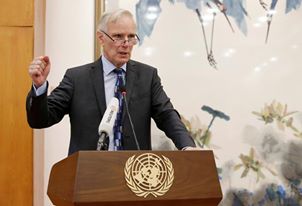Chinese Ambassador’s Controversial Speech Sparks Protests in Nepal
By Tsering Choephel

DHARAMSALA, 6 Sept: The speech by the Chinese Ambassador to Nepal, Chen Song, at the “China in Global Economy and its Impact in Nepal” conference on Saturday in Nepal has provoked concerns and protests among Nepalis. According to a report in The Kathmandu Post today, the address has raised alarm due to what former Nepali Ambassador to Denmark, Bijay Kant Karna, describes as China’s “hawkish and aggressive behaviour in Nepal.”
During his address at the event organized by the Foundation for Trans-Himalayan Research and Studies and Friends of Silk Road Club Nepal, Ambassador Chen Song lectured Nepal about its economic challenges and attributed them largely to its neighbor India, which he characterized as “not so friendly and not so beneficial to Nepal.”
Commenting on Nepal’s trade of electricity with India, he pointed out, “Last fiscal year, you exported Rs10 billion [worth] of electricity to India. How much did you import from India? My Nepalese friends, you imported Rs19 billion of electricity from India. You had a deficit in electricity trade, one of the products you are proud of, and you think that will bring you economic independence.”
Arun Subedi, a former foreign relations adviser in previous Nepal governments called on the current government led by Pushpa Kamal Dahal to send a diplomatic note and protest” against what some government officials view as “out of context, and uncalled for”, according to the report.
Constantino Xavier, a fellow in Foreign Policy and Security Studies at the Centre for Social and Economic Progress (CSEP) in New Delhi a fellow in Foreign Policy and Security Studies at the Centre for Social and Economic Progress (CSEP) in New Delhi, characterized Ambassador Chen Song’s address as China once again poking at India in the neighbourhood as China-India relations falter. He commented, “The Chinese ambassador portrays India as an obstacle to Nepal’s development. Also lectures Nepal on how to run its economy, create an ‘equal social structure’ and accept the ‘BRI gift.”
An official at the Nepal prime minister’s office, requesting anonymity, is quoted saying “He cannot make such comments on the internal affairs of Nepal. Nor can he comment about our relation with another neighbour that we are hugely dependent on” according to the report.
On the other hand, Bipin Adhikari, a noted lawyer in Nepal, however, thinks otherwise. He wrote on X (Formerly Twitter) “It may be undiplomatic, but whatever the Chinese ambassador has said, he has spoken the reality. It seems he is speaking in Nepal’s interest.”
Regardless of the truth in the Chinese envoy’s statements, the prevailing view is that China’s posturing in Nepal’s internal matters is undiplomatic and unwelcome.
Former Nepali ambassador to Denmark Bijay Kant Karna said “His statement is undiplomatic. It also shows the Chinese are seeking ‘some say and share’ in Nepal’s foreign policy conduct” and added “Why are they posturing so aggressively? In my personal observation, the Chinese side has maintained very hawkish and aggressive behaviour in Nepal after the visit of the Chinese President to Nepal, which we never found in other South Asian nations.”
Despite the ancient and strong historical, religious and cultural bond between Nepal and India, the Chinese Communist Party (CCP) has successfully increased its influence in Nepal through various manoeuvres.
In familiar CCP practices of exerting influence and power wherever its arms stretch, China’s investment in Nepal goes beyond the energy sector and infrastructure-building projects which helps China exert its political influence. The influx of Chinese tourists in Nepal occurs along with burgeoning Chinese business enterprises. China’s effort to cultural influence in Nepal through investing in Buddhist Sites such as Lumbini and through sending Chinese volunteers to schools in Nepal continues.
However, there is growing resentment against Chinese companies due to environmental and labor practices, border trade issues, and concerns about Nepalese students studying in China. China’s expansionist moves along the Nepal border, including encroachments in the Humla district of far western Nepal, have also raised concerns in Nepal.
Besides India, Indonesia Malaysia, Phillippines, Vietnam and Taiwan, there is a protest in Nepal against the “Standard Map” recently released by Beijing
According to a Times of India report on Saturday, “Nepal Student Union, one of the largest student political outfits in Nepal, staged a protest outside the Chinese embassy in Kathmandu on Thursday, demanding a ‘correction’ in the new map released by China.” They claim that areas like Lipulekh, Kalapni and Limpiyadhura, which the new Chinese Map has demarcated them within India, are in Nepal territory.





